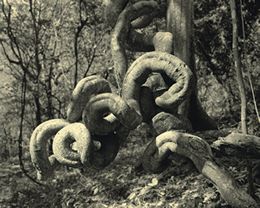 Dennis DeHart
Dennis DeHart
sLowlife: An Essay
 Dennis DeHart
Dennis DeHartPlants are among the slowest forms of life. Their movements, barely perceptible, beg no urgency or relevancy for most humans. We navigate a world that is moving at an ever-increasing pace and driven by constant communication. Consequently, plants are receding in our individual and collective consciousness.
Until the advent of industrialized agriculture, the rhythms of human society were aligned with the rhythms of plants. However, recent human history has defied these limitations. Now, the year-round availability of fresh produce, textiles, wood, and the myriad of other products on which we depend, has dimmed our awareness of their sources. Moreover, our inability to empathize with plants as living things has reduced our regard for them. We think of plants in terms of agriculture, science, or landscaping—if we think of them at all.
We value plants as forms that bring color, texture, fragrance, comfort, and curve
to the rectilinear hardscape of our cities, but that can now be achieved, indoors
and out, with realistic artificial plants. Everywhere we look, the globe is becoming
less “green” and measurably less alive. We seem not to notice.
The truth is, plants, humans, and most other life-forms are inextricably
intertwined, locked in a dynamic, co-dependent struggle for survival. It is
in our own self-interest to pay them more attention.